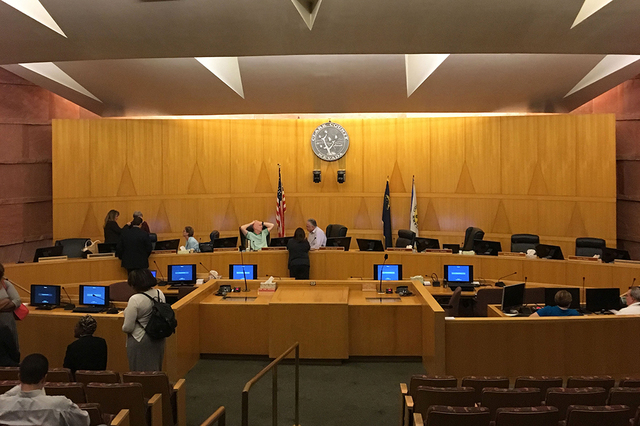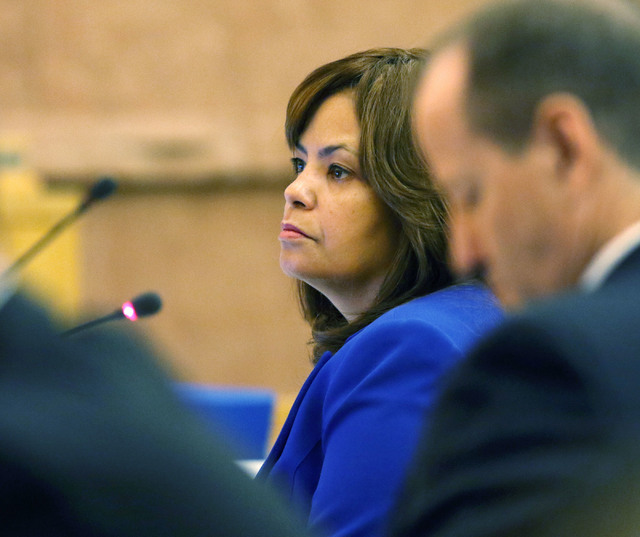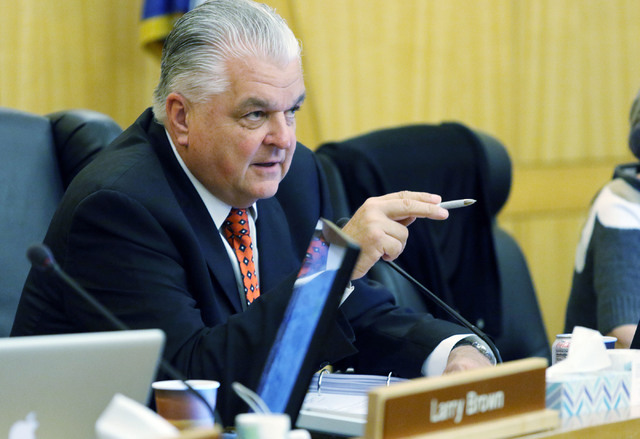Clark County Commission conditionally OKs $500K loan to Stadium Authority Board



Clark County commissioners will vote early next month on loaning as much as $500,000 to the Las Vegas Stadium Authority, under conditions that money is repaid promptly and spent under a watchful eye.
One stipulation of the loan would be that it is repaid in full by May 1. Another would require the stadium authority to submit monthly spending reports to county commissioners and staff.
“We’re wanting to make sure we carefully scrutinize how that money is being used,” said Commissioner Mary Beth Scow, who requested the stipulations during Tuesday’s commissioners meeting.
Commissioners will consider approving the loan agreement at their Jan. 3 meeting. Clark County Manager Yolanda King, whose staff will draft the loan agreement, said the county’s interest rate for short-term loans is about 2.5 percent.
Keeping tabs on the stadium authority’s spending should be made easier by a separate contract the commissioners approved Tuesday.
For $3,000 a month, county staff will be responsible for the stadium authority’s routine legal counsel, financial records and daily accounting and budgeting.
The loan would pay that contract and temporary staff from Applied Analysis, which the board is paying up to $25,000 a month for research and administrative duties.
The stadium authority — a public board tasked with choosing the site and approving contracts for a planned $1.9 billion stadium envisioned to be the new home of the National Football League’s Oakland Raiders — plans to spend the bulk of the loan on specialized legal counsel that will negotiate the stadium’s development and operating agreements.
The stadium authority received 30 applications from attorneys and law firms and is expected to choose its representation at its Jan. 12 meeting.
“We’re looking for someone who has experience in negotiating development and operating agreements with major league sport franchises, and the development of a stadium,” said Jeremy Aguero, a principal analyst with research company Applied Analysis.
Although commissioners passed the county’s contract with the stadium authority unanimously and without discussion, the possible loan drew criticism from Commissioner Chris Giunchigliani, the only one to vote against moving forward with the loan.
During the meeting, Giunchigliani floated the idea of the county initially loaning only $250,000 and considering loaning more after NFL owners vote early next year whether to allow the Raiders to relocate. A three-fourths vote of approval is required for the team to move.
“The financing is going to come from what little bit of money we have in our capital fund … it could become more of a delay (for other projects) down the road,” she said.
After the meeting, Giunchigliani said she was open to loaning the stadium authority money, but she was against giving a blanket amount of $500,000 without more details on how it would be spent. She added that approving such a large amount would hurt the stadium authority’s negotiations with law firms it may hire.
“We kind of played our hand before we needed to,” she said.
Aguero said it was vital for the stadium authority to have funds on hand so it could hire legal counsel to immediately begin drafting operating and development agreements. Some of that information will be used for the Raiders’ relocation application, he said.
“Legal counsel is expensive and the project is significant, so we expect the cost to be significant,” he said.
Commission Chairman Steve Sisolak said legal counsel could charge $800 to $1,200 an hour.
“It is nothing for one of these law firms to bill $100,00 a month,” he said.
The hotel room tax increase that will become the stadium authority’s primary source of funding goes into effect March 1, but the board doesn’t expect to have any of that money in hand until about April 15.
Aguero said he expected to stadium authority to receive about $13 million in tax revenue by June 30, the end of the fiscal year. That money will also fund the public’s $750 million contribution to the 65,000-seat domed stadium. Other funding for the stadium project includes $650 million from the Adelson family and $500 million from the Raiders.
The Review-Journal is owned by the family of Las Vegas Sands Corp. Chairman and CEO Sheldon Adelson.
Contact Michael Scott Davidson at sdavidson@reviewjournal.com or 702-477-3861. Follow @davidsonlvrj on Twitter.
RELATED
Intangibles make Las Vegas competitive for NFL franchise, analysts say
Clark County may loan $500K to stadium authority
High-profile contenders seek spot on Las Vegas Stadium Authority Board












